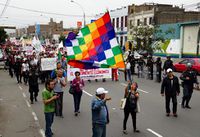Wechua Spring: Difference between revisions
No edit summary |
No edit summary |
||
| Line 1: | Line 1: | ||
The '''Wechua Spring''', also referred to as the Wechua Revolution, is a wave of both violent and non-violent demonstrations, protests, and riots in the | {{Infobox military conflict | ||
| conflict = The Wechua Spring | |||
| partof = | |||
| image = [[File:WechuaProtests.jpg|200px]] | |||
| caption = The ''Grito of Apurimaq'', the first demonstration in the Wechua Spring. | |||
| date = X 1662 - ''Present'' | |||
| place = The [[Wechua Nation]] | |||
| coordinates = | |||
| map_type = | |||
| map_relief = | |||
| latitude = | |||
| longitude = | |||
| map_size = | |||
| map_marksize = | |||
| map_caption = | |||
| map_label = | |||
| result = | |||
| status = Ongoing. | |||
| combatants_header = | |||
| combatant1 = Communist Soviet of the Wechua Nation;<br />Social Democrat Club;<br />[[Kʼanchaq Ñan]]. | |||
| combatant2 = The [[Wechua Nation]]<br /><small>Supported by:<br />[[Caputia]] (1662)</small> | |||
| combatant3 = | |||
| commander1 = Pacha Pinchi <small>(CSWN)</small>;<br />Awak Huanca Cocha <small>(Social Democrat)</small>;<br />Jaillita Pinto <small>([[Kʼanchaq Ñan|KÑ]])</small>. | |||
| commander2 = HM Manco Cápac;<br />Kayara Mayhuasca Soncco;<br />General Phakchay Chaupin.<br /> | |||
| commander3 = | |||
| units1 = | |||
| units2 = | |||
| units3 = | |||
| strength1 = | |||
| strength2 = | |||
| strength3 = | |||
| casualties1 = | |||
| casualties2 = | |||
| casualties3 = | |||
| notes = | |||
| campaignbox = | |||
}} | |||
The '''Wechua Spring''', also referred to as the Wechua Revolution, is an ongoing armed conflict between the government of the [[Wechua Nation]] and the insurgent [[Kʼanchaq Ñan]] (Shining Path) guerilla group, which is the armed wing of the Communist Soviet of the Wechua Nation (known as the CSWN, or the Ceswan). | |||
The Wechua Spring began as a wave of both violent and non-violent demonstrations, protests, and riots in 1662 AN in the cities of Apurimaq and Rimarima, organized by the Social Democrat Club and the Communist Soviet of the Wechua Nation. These protests gained lots of support due to dissatisfaction with the government of the Inkap Ratin Kayara Mayhuasca Soncco, steep increases in the prices of food and fuel, and high youth unemployment. Violent clashes between protestors and government forces in these cities triggered larger demonstrations in other cities like Parap, Auquimarca, and Huichajanca. | |||
--WORK IN PROGRESS-- | --WORK IN PROGRESS-- | ||
[[Category: | [[Category: Wechua]] | ||
[[Category: Wechua Nation]] | [[Category: Wechua Nation]] | ||
Revision as of 15:34, 22 July 2018
| The Wechua Spring | |||||||
|---|---|---|---|---|---|---|---|
 The Grito of Apurimaq, the first demonstration in the Wechua Spring. |
|||||||
|
|||||||
| Belligerents | |||||||
| Communist Soviet of the Wechua Nation; Social Democrat Club; Kʼanchaq Ñan. | The Wechua Nation Supported by: Caputia (1662) |
||||||
| Commanders and leaders | |||||||
| Pacha Pinchi (CSWN); Awak Huanca Cocha (Social Democrat); Jaillita Pinto (KÑ). | HM Manco Cápac; Kayara Mayhuasca Soncco; General Phakchay Chaupin. |
||||||
The Wechua Spring, also referred to as the Wechua Revolution, is an ongoing armed conflict between the government of the Wechua Nation and the insurgent Kʼanchaq Ñan (Shining Path) guerilla group, which is the armed wing of the Communist Soviet of the Wechua Nation (known as the CSWN, or the Ceswan).
The Wechua Spring began as a wave of both violent and non-violent demonstrations, protests, and riots in 1662 AN in the cities of Apurimaq and Rimarima, organized by the Social Democrat Club and the Communist Soviet of the Wechua Nation. These protests gained lots of support due to dissatisfaction with the government of the Inkap Ratin Kayara Mayhuasca Soncco, steep increases in the prices of food and fuel, and high youth unemployment. Violent clashes between protestors and government forces in these cities triggered larger demonstrations in other cities like Parap, Auquimarca, and Huichajanca.
--WORK IN PROGRESS--